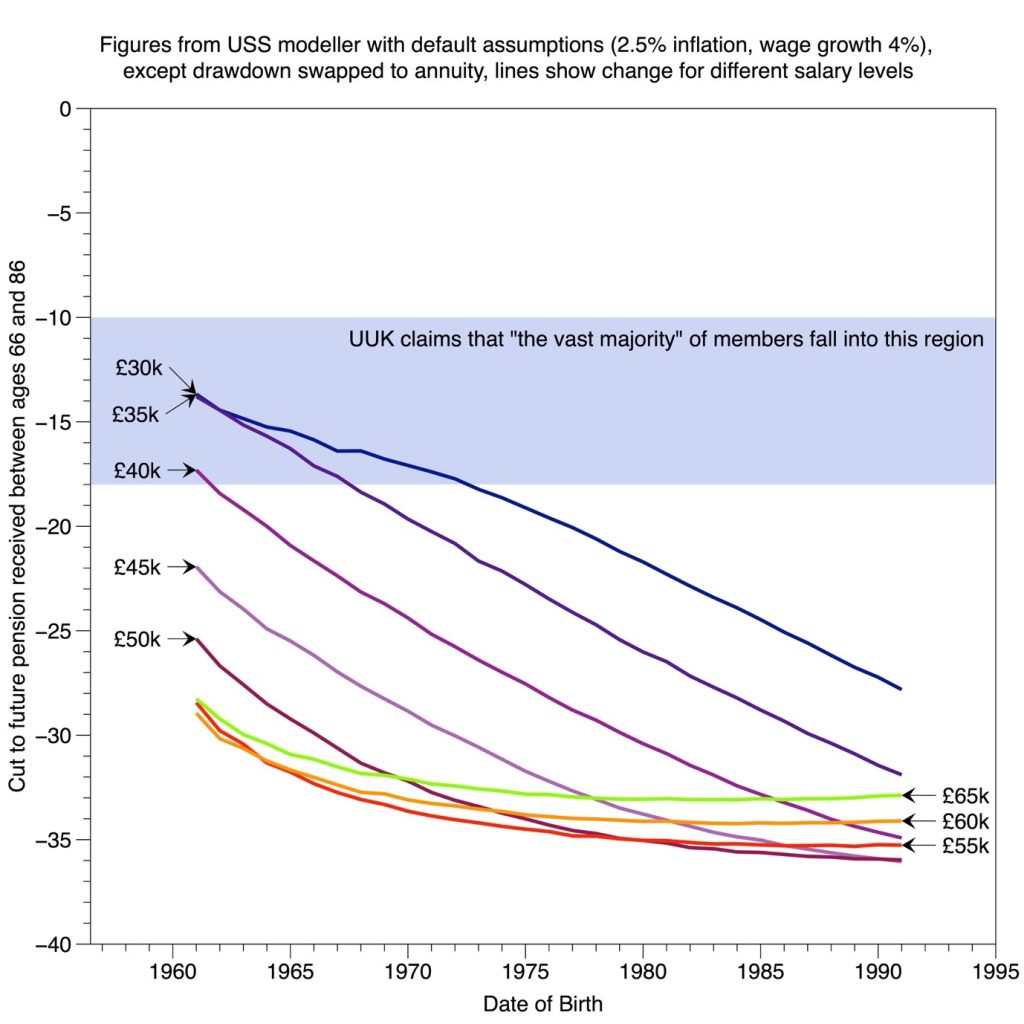USS Dispute: What has been happening?
17th January: branch officers meet with local management to discuss proposals that UCU could put forward to resolve the dispute. We explain how strike action could be avoided by both employers and employees agreeing to pay slightly higher contribution rates for a year to maintain existing benefits (employers: 23.7% for six months, 25.2% for six months; employees: 11% for six months, 11.8% for six months). Although the employer rate would be higher than under the UUK proposals, the average employer contribution rate between October 2021 and April 2023 would be less under these proposals (23.4%) than had been budgeted for (23.7% under the 2018 valuation).
24th January: branch officers meet local managers again to continue the discussion.
24th January: UCU receives a report from USS detailing members’ responses to the official consultation on UUK’s proposed cuts. This reveals strong support for maintaining existing benefits, even if it required contribution increases.
26th January: In light of the consultation responses, UCU formally tables its proposals in a letter to the Chair of the Joint Negotiating Committee. The union’s proposed resolution has three parts: (i) a joint call for a new moderately prudent valuation to supersede the discredited March 2020 valuation; (ii) maintenance of existing benefits until at least April 2023, with employers to pay 23.7% contributions for six months, then 25.2% for six months; employees to pay 11.0% for six months and 11.8% for six months; (iii) should USS refuse to conduct a new valuation then from April 2023 contribution rates would be capped at 25.2% (employers) and 9.8% (employees) with benefits reduced to the best possible available under these rates.
26th January: UCU’s proposals are discussed with local managers at the Academic and Related Staff Negotiating Subcommittee.
26th January: Without consultation with universities, UUK says that UCU’s “proposal does not appear to be a serious attempt to reach agreement as it doesn’t reflect the views employers have expressed in consultations.”
27th January: Loughborough responds to UUK. Management welcomes UCU’s proposals as a first step to resolving the dispute, but argues that point (iii) in UCU’s proposals is unrealistic.
31st January: UUK refuses to formally consult with employers on UCU’s proposal until USS confirms that the costings in the proposal add up. This is despite the proposal being based on figures provided by USS to both UCU and UUK in August 2021.
2nd February: UUK formally consults employers on a trivial modification to their own proposals, despite explicitly admitting that the new proposal was based on costings not validated by USS. For a 40 year old earning £40k/year, UUK’s modified proposal represents a 29% cut rather than the originally proposed 30% cut. UUK continues to refuse to consult employers about UCU’s proposals.
10th February: USS confirms to UUK that the UCU proposal is based on valid costings.
10th February: Two weeks after they received the proposals, UUK starts a consultation with employers on point (ii) of UCU’s proposals. They do not tell employers about point (iii) of the proposal (recall that point (iii) caps employers’ future costs, and is therefore critical). Mike Otsuka, UCU National Negotiator, writes to UUK expressing concern about this “serious misrepresentation of UCU’s proposals”.
12th February: UUK modifies its consultation materials in response to UCU’s concern, but continues to misrepresent the cost of the UCU solution. They write that UCU’s proposals would involve contribution rates of “at least 43%” whereas employer contribution rates would in fact be capped at 25.2% under the UCU proposals. Mike Otsuka writes again to UUK expressing concern at the continuing misrepresentation.
13th February: UUK describes UCU’s complaints about the inaccuracy of their consultation materials as being “simply UCU misinformation, which looks like a cynical attempt to increase turnout for their strike action”. This is a straightforward lie.
14th February: Industrial action starts. The branch begins to issue regular reports from the picket lines.
14th February: UUK modifies its consultation materials again, implicitly accepting that the previous versions contained errors.
15th February: In light of UUK’s confused communications, local managers write to LUCU seeking clarification about whether UCU’s proposals are identical to the solution discussed in the meetings of 17th, 24th and 26th January in local meetings. LUCU explains that they are.
16th February: At an Emergency General Meeting of LUCU the branch passes a motion providing strike pay to hourly paid staff from the first day of the action, partly funded by a generous donation from our friends in Loughborough’s Unite the Union branch. Other colleagues who need support to take strike action are directed to the union’s national fighting fund.
18th February: Loughborough responds to UUK’s consultation:
Our initial response to the UCU proposal welcomed it as a potential first step to a negotiated solution and we encouraged UCU and UUK to work constructively to build an implementable solution, noting the very tight timeframes involved. We called on industrial action to be suspended whilst this took place.
· We continue to welcome UCU’s acceptance that benefit changes are likely to be necessary in securing a resolution (UCU’s letter says they will accept the ‘[securing of] current benefits or, if not possible, the best achievable as a result of the … valuation’).
· We have stated in previous consultations that we believe the current valuation was excessively prudent and call for a new moderately prudent valuation at the earliest opportunity.
· We would be willing to consider some increase in employer contribution, but 25.2% is not sustainable. Any figure that is arrived at should be based on an extension of the current cost sharing model so employee contributions rise in proportion.
We call upon UCU and UUK to urgently seek a solution based on these three points.
Industrial action serves no benefit while this happens and should be paused.
(Aside: the third bullet point in the University’s consultation response involves a strange invocation of USS’s existing cost sharing model. In fact UCU’s proposal is consistent with current USS rules. Specifically, under UCU’s proposal the cost of maintaining current benefits would be split 65:35 between employer and employee, as required by USS Rule 76.4. Rule 76.4 only applies to situations where existing benefits are maintained and not to situations where benefits are changed (i.e. not to point (iii) in UCU’s proposal). Clearly benefit reductions fall entirely onto members rather than employers, so it would not be reasonable to expect the cost sharing rules that apply when there are no benefit reductions to also apply when there are.)
21st February: UUK announces that 93 of 97 employers “do not support” the UCU proposal (it is unclear how Loughborough’s response was categorised). An analysis of consultation responses reveals that at least some employers misunderstood the proposal (for example, some employers explicitly state in their responses that they could not afford employer contributions of 29.1%, when the UCU proposals caps them at 25.2%). Given this, we simply do not know how many employers would have supported UCU’s proposals if a competently conducted consultation had taken place.
21st February: USS announces that, even using its own highly pessimistic valuation method, the scheme’s funding position has improved from 83%-funded to 97%-funded since the March 2020 valuation date. Nevertheless, UUK decides to press ahead with cuts to pensions based on the earlier 83% value.
22nd February: The first phase of industrial action ends.
22nd February: At USS’s Joint Negotiating Committee the ‘independent’ chair votes in favour of UUK’s cut to your pension.
23rd February: Josephine Cumbo, the FT’s Pensions Correspondent, writes “I have covered UK university sector disputes over pension cuts since 2017 and can say that I have not seen members so angry as they are today over fresh cuts to their retirement benefits. The anger has reached a new depth. This does feel like a turning point.”
In summary: the last few weeks have taught us that UK universities have been willing to cut staff pensions by up to 35%, despite accepting that the valuation the cuts are premised on is flawed. To achieve this, UUK, the employer association, has been willing to misrepresent UCU’s proposals and then lie about doing so.
We’re now faced with a decision about how to respond. UCU’s Higher Education Committee meets on Friday.
LUCU Committee


